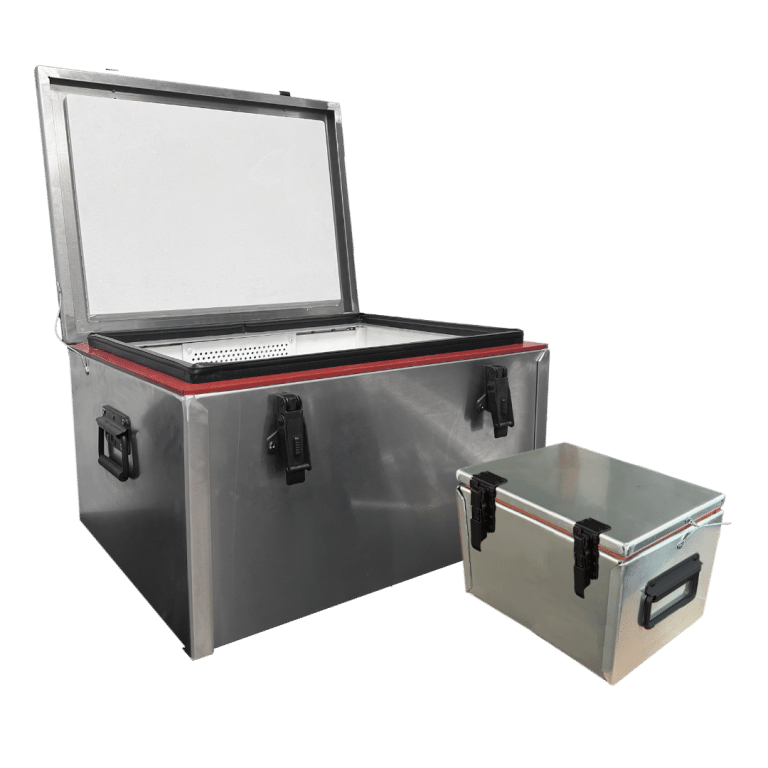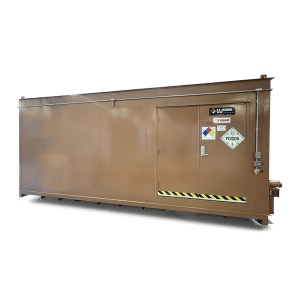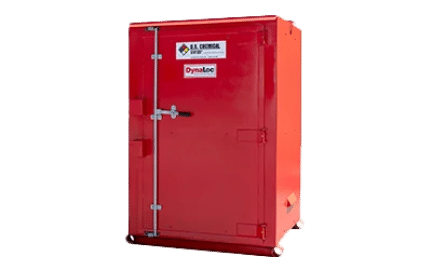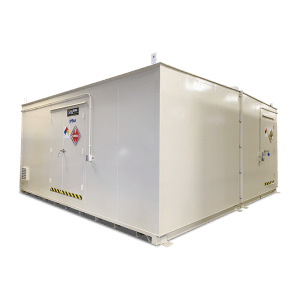Lithium Battery Solutions for Military
U.S. Chemical Storage specializes in code-compliant lithium battery buildings for government and military entities and unique military mission-critical applications.
For storage, charging, assembly, transport or testing of battery-powered equipment, our solutions utilize the safest construction and cutting-edge engineering for protection against injuries or loss of mission-critical equipment.
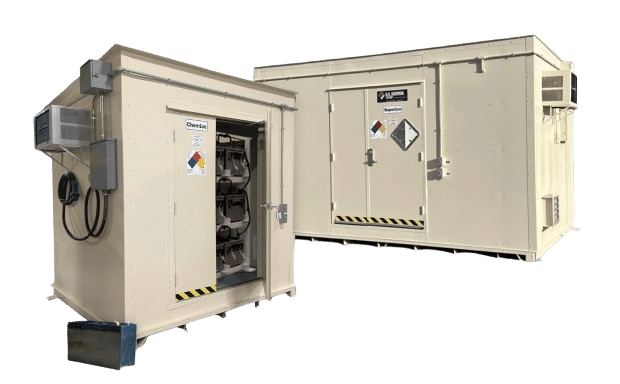
Engineering know-how to find the perfect solutions to your lithium battery storage and transport problems.
Easily Store, Charge, and Transport Lithium Batteries
Governmental Lithium Battery Solutions
Military bases cannot afford injuries and the loss of mission-critical equipment. Comms, robots, drones, vehicles, and more are utilizing the ease of rechargeable lithium batteries to make missions safer for our troops.
A lithium battery explosion at a military base recently destroyed $70,000 of batteries. They were stored in a plastic and foam case that is common for use with weaponry. Smoke emitted while charging a small drone lithium battery set off a water sprinkler system. Unfortunately, the water then set off a new reaction, and the batteries exploded, leading to a thermal runaway event that ignited the case and surrounding materials.
Lithium battery fires ARE different and they have unique properties and behavior to other types of deflagration. They commonly exhibit the six common characteristics:
- Violent Explosions - which can cause injury, as well as throw the fire to other areas quickly
- Extremely High Heat - which can easily ignite surrounding materials very quickly
- Toxic Gas and Fumes - Dangerous hydrogen gas, as well as metals are present in the offgassing fumes
- Re-ignition Behavior - fires can re-occur in hours, days, or even WEEKS after thought to be extinguished
- Dense Smoke - which can obscure vision and prevent safe egress
- Speed of Combustion - a thermal runaway event happens very quickly, in a matter of seconds, not minutes
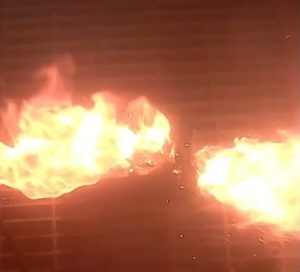
- Never compromise convenience for personnel or operational safety, especially when the mission must not fail. Intermodal shipping containers (aka ISO containers or Conex boxes) for hazmat storage do not qualify as a compliant storage solution.
When storing chemicals, the military requires EPA and NFPA compliance. Globally, storing, charging, and transport of lithium batteries is being scrutinized for the inherent dangers.
We have built many lithium battery buildings for military locations like yours with the features you need. Let us share what we know for the fire and life safety of this increasingly crucial source.
Easily Store and Handle Lithium Batteries
Fire Safety is Never Optional
Military bases cannot afford injuries and the loss of mission-critical equipment. Comms, robots, drones, vehicles, and more are utilizing the ease of rechargeable lithium batteries to make missions safer for our troops.
A lithium battery explosion at a military base recently destroyed $70,000 of batteries. Smoke emitted while charging a small drone lithium battery set off a water sprinkler system. Unfortunately, that set off a different reaction, and the batteries exploded. These fires burn extremely hot and can reignite hours, days, or even weeks after an event.
Never compromise convenience for personnel or operational safety, especially when the mission must not fail. Intermodal shipping containers (aka ISO containers or Conex boxes) for hazmat storage do not qualify as a compliant storage solution.
When storing chemicals, the military requires EPA and NFPA compliance, however, regulations have not caught up to the growth of lithium battery risks. Globally, the safety and protocols surrounding storing, transporting, and charging lithium batteries is being scrutinized for the inherent dangers. We have built many lithium battery buildings for military locations like yours with the features you need. Let us share what we know for the fire and life safety of this increasingly crucial source.
Features & Benefits
- Cost-effective code-compliant solution
- Fast availability within 3-months
- 100% customizable for specialized needs
- Easy to Relocate
- Modular solutions available for larger footprints
- Multi-room units available for storage and charging
- Secure on-base delivery & install
- Durable coating for UV and weather protection
- FM-Approved
- 15-year structural warranty
- Durable FM approved steel construction
- Prefabricate with turnkey installation available
- Decades of experience working with the military
Common Applications
- Drones
- Comms
- Robots
- Vehicles
- Power Tools
Frequently Asked Questions
In our experience, a 2-hour or 4-hour rated building is adequate. Upon speaking with a technical sales engineer, you may determine if explosion-proof HVAC or ventilation options would be helpful. Sprinkler systems with large hose hookups to drench a fire event are suggested. Beyond that, detectors, alarms, strobes and other equipment can be determined.
Violent Explosions – which can cause injury, as well as throw the fire to other areas quickly
Extremely High Heat – which can easily ignite surrounding materials very quickly
Toxic Gas and Fumes – Dangerous hydrogen gas, as well as metals are present in the offgassing fumes
Re-ignition Behavior – fires can re-occur in hours, days, or even WEEKS after thought to be extinguished
Dense Smoke – which can obscure vision and prevent safe egress
Speed of Combustion – a thermal runaway event happens very quickly, in a matter of seconds, not minutes
The code surrounding lithium batteries is currently in a lot of development. In coming months, the NFPA, NFC, and ICC are all likely to have information come out of committees. The items we have seen so far from such committee discussions, synch up perfectly with the “prefabricated portable buildings” that we have been designing for the military and corporate clients for years now.
We make it our job to stay on top of developments and share our information and capabilities with you. Trust our experience to cover your risk exposure today and tomorrow.
The DynaLoc LTC is a ‘lithium transport container’ designed for the military to safely transport damaged, defective, recalled, or simply disassembled batteries from one location to another. It can also be used to quarantine batteries suspected of damage safely. You can learn more about the LTC here.
Request a Quote
DynaLocLTC Lithium Transport Box
Ensure that the risks which lithium batteries have during transport are properly contained. View >Military Hazmat Buildings
We specialize in code-compliant chemical storage buildings customized for government entities and unique military mission-critical requirements
DynaLoc Explosive Storage Magazines
We supply quality engineered Type 2, Type 3, and Type 4 magazines for the storage and transportation of both high and low explosives and ammunition. All made in USA.
Modular Storage Buildings
Multi-section modular buildings can be configured in multiple pieces so they are still transportable by truck. They can be configured horizontally or vertically.


